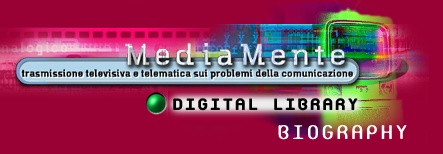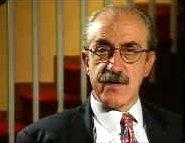 |
 |
Interview
Biography |
|||
| Born in Monterotondo Marittimo (Grosseto), 24 January 1939, when he
was very young his family moved to Sienna, where he completed his
studies. While still at school he was already contributing to
newspapers and magazines, specialising in cinema criticism and
contributing to the organisation of highly appreciated film cycles for
young people. He continued his studies at the Literature and
Philosophy Faculty of the Scuola Normale Superiore in Pisa, concerning
himself in particular with modern and contemporary Italian literature
and contemporary political history. He belongs to the Tartuca contrada
of Siena.
He joined the Italian Socialist Party in 1956, and was a member of the national executive of the Young Socialist Federation and the party's national schools commission. In June 1967 he was elected for the PSIUP (Italian Socialist Party of Proletarian Unity) to the Sienna Council and in 1969 became Deputy Major, with responsibility for the police force. In November of the same year, at 30 years old, he was elected mayor of the city of Sienna, a position he held until February 1974. He was later Deputy Major, with responsibility for education, Culture, Tourism and Sport. Elected for the Communist Party, he became regional councillor, with responsibility for General Affairs, Personnel and the decentralisation of the region of Tuscany from 1975 to 1979. From 1979 to 1984 he was again Deputy Major of Sienna, with responsibility for urban planning. In his political positions in Sienna and Tuscany he has been primarily concerned with issues of urban planning, political cultural and social services, as well as the promoting high-level relationships for Sienna and Tuscany. He has also been a member of the CRPET (the Tuscan regional committee for economic planning, the administrative council of IRPET (Tuscan regional institute for economic planning), the regional directorate of ANCI (National Association of Italian Councils), the administrative council of the UniversitÓ degli studi in Siena and, the administrative council of the Accademia musicale Chigiana, the Accademia degli Intronati and the Azienda Autonoma di Turismo. He has also been secretary of the Sienna section of Italia Nostra and a partner in the INU (National Urban Planning Institute). In June 1984, candidate for the Communist Party in a constituency in Central Italy, he was elected deputy to the European Parliament. He was re-elected in 1989 and 1994 his third mandate ending in June 1999. During his parliamentary career he has been Vice President of the European Parliament and President of the Culture Commission. He is currently a member of the Culture Commission and the Legal Commission, where he is co-ordinator of the Socialist group. Using his previous experience as well as a personal vocation, during his years in the European Parliament he has been largely concerned with cultural policy, the harmonisation of laws regarding television and the information society, audiovisual production, and author's rights. "I confini del visibile" (The Borders of the visible) is the title of his latest book, which brings together the results of his work in this field, alongside essays and speeches. He has worked on cinema productions and television programmes. Alongside his political and institutional work, he has also maintained a busy schedule of teaching, research and journalism. He has taught the history of Italian literature at the University of Italian Language and Culture for Foreigners, where he continues to hold courses and seminars. His many contributions to reviews and magazines in the past include: "Il Ponte", "L'Astrolabio", "Problemi del Socialismo", "Politica e SocietÓ", "Critica Storica", Studi Storici", "Bullettino Senese di Storia Patria", "La Nazione", "Il Giornale del mattino", "Il Nuovo Corriere Senese". And he currently contributes to: "L'UnitÓ", "Diario della Settimana" and "Gulliver". In 1967 he edited the national magazine "Test". His studies, conferences, historical and literary essays on personalities such as Caterina Benincasa, Federigo Tozzi, Cesare Brandi, Mino Maccari, Ranuccio Bianchi Bandinelli, Giuseppe Bettalli, Eugenio Montale, Luigi Piccinato and Romano Bilenchi, have been accompanied by speeches, essays and articles, as well as a modern analysis of the historical tradition of the Palio di Siena in all its complexity, and an examination of the problems related to the safeguarding of the architectural heritage of Tuscany. |
 |
